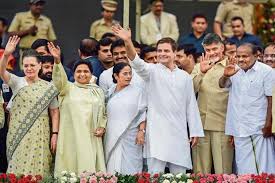Goodbye Coalition Politics, Welcome To The Era Of Uncertain Alignments

The BJP’s emphatic victory in the 2019 Lok Sabha elections throws the political field open for new alignments and possibilities. The pattern of old politics is set to change or get an overhaul to accommodate the changing reality.
The most important area where it is likely to be visible is in the character of coalitions, which dominated Indian politics for close to three decades.
The era of coalition politics is over. Yes, NDA is a coalition, but it is more a product of choice than of necessity. It is not a genuine one in the sense that the smaller regional parties do not contribute their numbers to help the big anchoring party form a government and extract a bargain in return.
The BJP’s massive mandate, the second one in succession, has ensured that despite being partners in the government, they don’t carry real heft. The BJP won’t be required to bend over backwards to please them. They simply cannot afford to use withdrawal of support as a threat.
We have entered a phase of an overwhelmingly dominant single national party and a presidential-style election where votes are cast on the basis of one man’s – Narendra Modi’s – personal appeal, making regional parties less relevant in national elections. This trend could continue till both factors weaken but it does not seem like a possibility in the immediate future.
For regional parties in the Opposition’s configuration the situation is worse. With no national party to fall back upon, their scope to have a say in national politics or policy-making is zilch. The Congress, the party which anchored the UPA, is no more in a position to act as a binding force. Its own survival is at stake and it might take years, even decades, for it to revive as a national force. It means the state-based parties will remain confined to their states, battling it out with either the BJP or a party or parties aligned with it for power. Given the current turn of politics, there won’t be talk of the leader of a regional party aspiring for the job of prime minister for a long time to come.
Regional parties in both camps are headed for trouble if the national parties decide to be less charitable and expand their bases in states where they play second fiddle. For example, if the BJP decides to go it alone in Punjab or Bihar, it could spell serious trouble for the Akali Dal and the Janata Dal (U) respectively. The situation would be similar if the Congress decides to rejuvenate its organisation in states where its allies are weak. It may not win many seats, but it certainly can damage the prospects of the ally. It is a distinct possibility that the party would expend energy on getting back on its feet in states to win back its national credentials.
For the allies, it is not good news that they have suffered an erosion of their core vote bases. Yadavs don’t vote overwhelmingly for the Samajwadi Party in Uttar Pradesh or Dalits for Mayawati’s BSP. In Bihar, Yadavs were not too keen on the RJD either.
Even the so-called Muslim vote bank, as suggested by results in Muslim-dominated seats, is not solid. It means parties born out of Mandal politics have lost resonance among their core banks. All castes and communities are open game now and the party which navigates the complex equations involving them well could emerge the winner. Expect the competition in states to get intense.
Since Hindutva is the in-thing now and it has great capacity to swing votes, expect a rush for the Hindu vote bank among parties. The BJP has the sole claim to it at this point, but it might change over time. Hindus, like Muslims, are not a monolithic vote bank and are susceptible to political manipulations. It would be interesting to note how politics over Hindus pans out in the coming days.

Comments are closed.